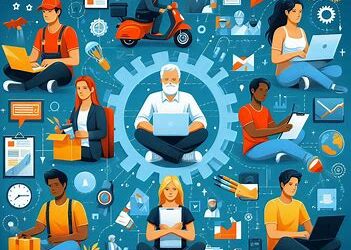The 180 Pulse
With thought-provoking articles covering varied domains, 180DC SRCC aims to create student leaders through a holistic learning experience.
Read to take a deep dive into looking at world issues from the eyes of a consultant.
BUSINESS AND FINANCE
Wealth Tech Consulting: The Future of Financial Advisory
Fueled by fintech’s rise, wealth tech consulting is a rapidly growing field. These consultants act as a bridge, guiding traditional financial institutions to adopt cutting-edge tech like robo-advisors and AI. This not only enhances client experiences but also streamlines operations, keeping firms competitive. Wealth tech consultants are architects of the future, shaping how finance leverages technology to reshape wealth management. Check out Harish Kumar’s detailed exploration of the wealth-tech consulting and its promising future.
From E-tail to Retail: The Omnichannel Shopping Experience
The retail landscape undergoes a seismic shift. E-commerce (e-tail) has shattered the walls of the traditional shopping experience. Omnichannel retail, a revolutionary approach, orchestrates a symphony of online and offline experiences, forging a singular, unified customer journey.
Explore the ascendance of omnichannel and the potent benefits it bestows upon both businesses and consumers. Discover how retailers are rewriting the retail script, crafting a world where convenience waltzes with immersive experiences, and every touchpoint becomes a battleground for customer loyalty.
Check out Gunika Kakkar’s article as she delves into the intricacies if ever-evolving shopping landscape.
The Art of Launching Products
A successful product launch is vital for introducing a new product and boosting a company’s brand image. It is crucial for creating buzz, attracting media, investors, and influencers, and boosting initial sales. The success of the event hinges on a captivating product presentation, tailored to engage and resonate with the audience.Discover the strategies and best practices that can turn a product launch into a memorable and impactful event, ensuring lasting success. Check out Samarth Aggarwal’s article as he delves into the intricacies of a product launch event and offers valuable insights into making it a success by drawing inspiration from past iconic product launch events.
SCIENCE AND TECHNOLOGY
DevOps: A Practice to Efficiency
DevOps and cloud computing are a dream team. Cloud’s on-demand resources and automation fuel DevOps’ agile software delivery. This dynamic duo streamlines processes, boosts development speed, and optimizes resource allocation. By embracing both, businesses unlock innovation and gain a competitive advantage. The future of DevOps is bright, with a projected market size of $25.5 billion by 2028. As cyber threats evolve, DevSecOps, which integrates security into the DevOps lifecycle, is gaining traction. Check out Aadi Jain’s article as he delves into the intricacies of DevOps.
Generative AI in the Workplace
Generative AI is expected to enhance the world economy by $4.4 trillion annually, according to McKinsey. However, ascent creates duality. Over the next ten years, Goldman Sachs predicts a 1.5% increase in productivity and a 7% increase in the GDP. On the other hand, by 2030 the ILO expects 12 million employment shifts, mostly in food, office, production, and customer service roles. the pattern? adaptation via upgrading one’s skills. Resounding effects of a revolutionary workplace are Accenture, Axios, and Gartner. However, moral conundrums, data privacy, and profound weaknesses in fakes loom, necessitating strict governance systems.”
Read more to find out Shreyansh Krishna’s take on the future of Gen AI in the workplace.
Use of Data Analytics in Sports
In a world where victory is often decided by the narrowest of margins, data has emerged as the ultimate weapon in the arsenal of athletes, coaches, and teams alike.
From tracking player movements to analyzing opponent tendencies, sports analytics is transforming the way the game is played and understood.
In this comprehensive article, we delve into the fascinating realm of sports analytics, exploring its impact on everything from player performance to team strategy.
Discover how data is being used to gain a competitive edge, and learn about the cutting-edge technologies that are shaping the future of sports.
ECONOMIC AND PUBLIC POLICY
The Gig Economy: A Disruption or a Revolution?
The gig economy is transforming the labor landscape with its emphasis on short-term contracts and freelance work. This insightful article traces the evolution of gig work, from its historical roots to its current digital incarnation through platforms like Uber. It examines the benefits of flexibility and independence, alongside the challenges of job security and worker protections. This analysis provides a comprehensive look at how the gig economy is reshaping both the workforce and the broader economic environment.
Check out Shereen Bindroo’s detailed exploration of the gig economy and its far-reaching implications.
The Future of the Global Reserve Currency: Is the Dollar’s Reign on the Brink?
For decades, whispers of a ‘currency multipolarity’ echoed in academic circles, suggesting the dethronement of the US dollar as the world’s reserve currency. However, the past few years have shown these predictions to be just that – predictions. While challengers may emerge, the US dollar continues to reign supreme, backed by a robust economy, deep financial markets, and the stability of democratic institutions. Check out Aashi Sharda’s article as she delves into the historical and economic factors that solidify the dollar’s dominance and what the future of global reserve currency looks like.
Game Theory in Everyday Life: Decisions, Strategies, and the Prisoner’s Dilemma
In the captivating realm where life’s choices intertwine with economic principles, exploring the pervasive presence of game theory in our daily lives becomes imperative.This riveting article disentangles the intricate threads woven by game theory into the fabric of our existence. From interpersonal bonds to high-stake corporate manoeuvres, the principles of rational choice and interconnected decisions are laid bare with meticulous precision. Brace yourself for an expedition that unveils the hidden complexities lurking beneath seemingly mundane choices, as game theory’s veil is lifted to reveal its profound influence on our lives.
Unravel the nuances by immersing yourself in the complete narrative, where insights challenge conventional wisdom and illuminate a path towards more thoughtful and effective decision-making in our strategic dance called life.
Read Shreya Jain’s article as she explores the intricacies of game theory in her 180 Pulse article.
PSYCHOLOGY & HISTORY
Psycho-Strategists: Navigating Corporate Success through Consulting Psychology
Combining psychology and strategic thinking, a new breed of consultants is emerging: the psycho-strategists. These experts help organizations address challenges by understanding the psychological dynamics at play. They design interventions to improve employee well-being, manage talent effectively, and navigate change with greater ease. By leveraging psychological insights, psycho-strategists are shaping the future of organizational consulting.
Check out Sara Maheshwari’s article as she delves into the intricacies of Consulting Psychology.
The Art of Negotiation: Applying Psychological Principles for Success
This piece offers specific advice for negotiation success by delving into psychological concepts. It stresses the importance of empathy and active listening for establishing genuine connections and gaining insights. Cognitive biases like the anchoring effect are explored, along with strategies for maximizing the impact of recommendations. The pre-negotiation stage, including refining BATNA and conducting thorough research, is thoroughly covered. Trust-building, emotion regulation, and creative problem-solving techniques are discussed for managing high-stakes transactions or personal disputes, enhancing negotiation skills, and redefining success on personal terms, fostering confidence and composure in negotiations.
The psychology behind decision making: How humans think?
Coffee or Tea? Burgers or Pizzas? People spend a large part of their day making decisions. An average human makes around 35,000 decisions in a day and it takes around 7 seconds to make a decision. The process of decision-making is very complex. It begins with extensive thinking about a particular topic, developing a perspective about it and applying logic, reason and intuition to make a decision. While logic and intuitions may seem to be polar opposites, a rational person will inculcate both these factors to make a sound decision. However, people often end up making bad decisions due to incomplete and improper information, lack of thinking and being overwhelmed by emotions and intuitions. While making important decisions, a person must be calm and composed which succors in making sound judgement. Uncover the surprising insights by reading this article now!












